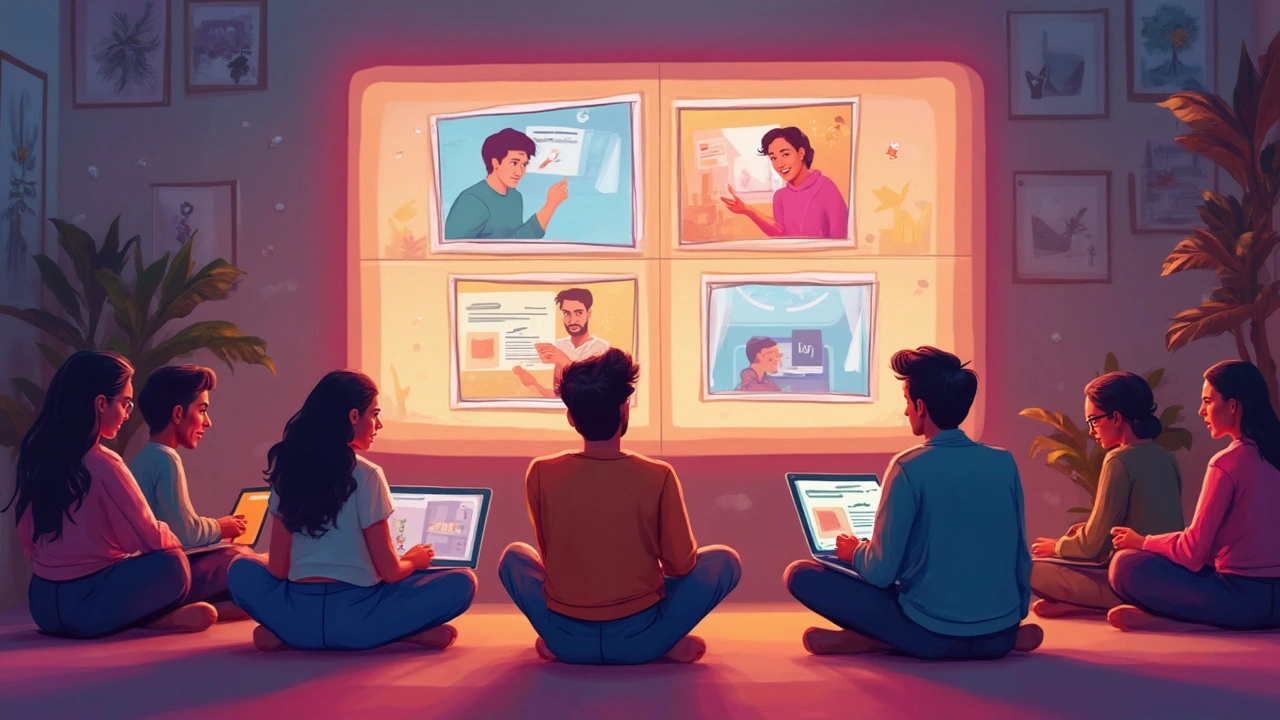Are Free College Courses Worth It? The Real Scoop on Online Learning

Free college courses sound like a no-brainer, right? They let you dip your toes into all sorts of subjects—from coding to history—without a dent in your wallet. But here’s the thing: not all free online courses are created equal. Some actually help you learn marketable skills, while others just give you a taste of the basics, with the good stuff locked behind paywalls.
If you're eyeing a way to build your resume, earn a legit certificate, or just satisfy your curiosity, free college courses can be solid. But the catch? Big names like Harvard or Stanford will happily offer free lectures, but if you want proof you finished, there’s usually a fee for that certificate. So, you have to ask yourself: are you in it for the skills, or do you need something shiny to add to your LinkedIn?
- How Free College Courses Work
- What You Really Get for Free
- When Free Online Courses Make Sense
- Tips to Get the Most Out of Free Learning
How Free College Courses Work
Here's the nuts and bolts of free college courses: colleges and groups post recorded lectures, assignments, and readings online—usually on platforms like Coursera, edX, Udemy, and FutureLearn. Instead of a classroom, you get video lectures, PDFs, discussion boards, sometimes even quizzes and peer feedback. The big difference: you’re not shelling out cash for tuition, and you can learn at your own speed.
Most of these courses come from well-known universities or trusted professionals. You can jump into MIT’s intro to programming, or dabble in art history from the University of Oxford, all without moving an inch from your couch. Here’s a typical setup:
- Log into a platform like Coursera, edX, or Saylor Academy
- Pick a topic or search by school, career, or skill
- Enroll for free—no need for transcripts or applications
- Watch videos and do assignments on your schedule
- Join community forums if you want to ask questions or discuss topics
But there’s a catch. Even the top online courses may limit what you can access or turn in unless you pony up for a paid upgrade. For instance, you might be able to watch all the videos, but graded assignments, teacher feedback, or a certificate of completion often come with a price tag. Here’s a snapshot of what you can expect:
| Platform | Free Access | What’s Behind a Paywall? |
|---|---|---|
| Coursera | Video lectures, readings | Quizzes, certificates |
| edX | Course content, forums | Graded assessments, certificates |
| Udemy | Few select courses | Most courses, certificates |
| Saylor Academy | Full courses, exams | Proctored credit exams |
Some places, like Saylor Academy, offer everything for free—including the final exam—unless you want official college credit. For most others, access to graded stuff or official proof you finished is extra. Education cost drops to zero, but just know the business model is usually 'try for free, pay for proof.'
What You Really Get for Free
So, what does “free” really mean when it comes to free college courses? Let’s clear up some confusion. Most platforms like Coursera, edX, and even MIT OpenCourseWare give you open access to video lectures, reading lists, and sometimes quizzes—no charge and no catch. You can actually study entire courses from schools like Harvard or Yale without dropping a dime.
But there’s a catch you might not expect: if you want a certificate or anything to show off to employers, you typically have to pay up. For example, on Coursera, you can watch all the class content for free, but a certificate with your name usually runs $49 to $199, depending on the course. edX is the same story. The learning is free; the proof of it isn’t.
Here’s the good stuff you usually get completely free:
- Watch or download video lectures—these are often the same ones paid students see
- Access reading lists, recommended books, and articles
- Take self-check quizzes or practice tests
- Use discussion boards (these help if you like learning with others)
What you usually don’t get for free:
- Official transcripts or “credit” from the college
- Graded assignments or instructor feedback
- Shareable or verifiable certificates for online courses
To put it in perspective, check out this quick breakdown:
| Platform | Free Content | Paid Extras |
|---|---|---|
| Coursera | Videos, readings, discussion boards | Certificates, graded assignments |
| edX | Videos, readings, ungraded exercises | Certificates, graded work |
| MIT OpenCourseWare | Videos, readings, no sign-up needed | None (no certificates offered) |
If you’re looking for solid knowledge or want to learn a skill on your own time, these free college courses are seriously underrated. But if your main goal is to prove your skills to schools or employers, you’re going to hit that paywall more often than not. At the end of the day, these courses are a great way to upgrade your skills for free, but don’t expect a golden ticket unless you’re willing to spend a little extra.

When Free Online Courses Make Sense
There are times when free college courses are actually your best move. If you’re exploring a new field and want to see if it’s for you, free online courses let you sample subjects without throwing down a credit card. Let’s say you want to check out web development, digital marketing, psychology, or graphic design—you can do real intro lessons with no risk.
Free courses also work well for upskilling on the side. Already have a job but want to pick up some new tech skills or brush up on Excel? You don’t need to go back to school or pay for a certificate—just learn what you need. Sites like Coursera, edX, and Khan Academy offer free content from top schools, with many making their video lectures fully open.
If you’re prepping for a standardized test or professional exam, it’s smart to grab free prep classes if your budget is tight. MIT OpenCourseWare is famous for dropping full actual class materials online, and Google has free tech training through platforms like Google Digital Garage.
Let’s get concrete—here are a few cases where free online courses actually make sense:
- Testing the waters in a new subject before investing in a paid course or degree
- Learning job skills quickly without waiting for company training
- Prepping for certifications or exams using open resources
- Keeping your mind sharp during downtime or between jobs
- Building a portfolio or sample projects to show off to employers
Don’t count out networking, either. Some free courses have forums or discussion groups where you can meet others learning the same things, which sometimes leads to job tips or leads.
Here’s a quick look at how often people actually complete free courses, based on 2023 data from Class Central:
| Course Platform | Completion Rate (%) |
|---|---|
| Coursera (free track) | 8 |
| edX (audit track) | 6 |
| FutureLearn (free) | 11 |
Completion rates are low compared to paid options, so if you’re jumping in, make a plan to actually finish. Treat it like a scheduled class instead of just a casual scroll.
Tips to Get the Most Out of Free Learning
If you’re serious about squeezing as much value as possible from free college courses, a few smart moves can make a huge difference. The internet has way more options than you could ever complete, so it pays to be picky and strategic.
- Pick the right platform. Some sites like Coursera or edX are known for their high-quality online courses from real colleges. You’ll find courses made by professionals or college profs, not random creators. Look for courses with decent ratings, lots of reviews, and clear outlines on what’s covered.
- Set a schedule—and stick to it. It’s super easy to lose motivation. Block out time each week for studying, just like you would for an in-person class. Even one or two hours on the calendar can help you finish strong instead of dropping out halfway.
- Take real notes. Don’t just watch videos passively. Jot stuff down, make a cheat sheet, or organize info in your own words. Research from Princeton found students who take handwritten notes actually remember more.
- Do the work, even if it’s optional. Free classes usually give you exercises, quizzes, or coding projects. Don’t skip these—they turn abstract info into real skills you’ll remember. If possible, do the discussion forums. You’ll learn faster with feedback.
- Look for free certificates. Not all free courses give certificates, but some do. Google Digital Garage and Microsoft Learn sometimes offer verified proof of completion for $0. That’s handy when you want to add something credible to your job applications or LinkedIn.
- Tie it to your goals. Before you dive in, ask yourself what you want out of the course. Gaining a new job skill? Exploring a hobby? This will keep you focused and help you pick content that matters.
Just to show you the difference platform choice can make, here’s a quick table comparing some heavy hitters:
| Platform | Best For | Certificate | Top Subjects |
|---|---|---|---|
| Coursera | University content | Paid | Data Science, Business |
| edX | University content | Paid | Computer Science, Humanities |
| Google Digital Garage | Business/Tech skills | Free | Digital Marketing, IT |
| Khan Academy | Basic Subjects | No | Math, Science, Economics |
In short, use free college courses to stack up new skills or knowledge, but don’t expect magic by just signing up. Treat it seriously, put in the effort, and you’ll see actual results.
Write a comment